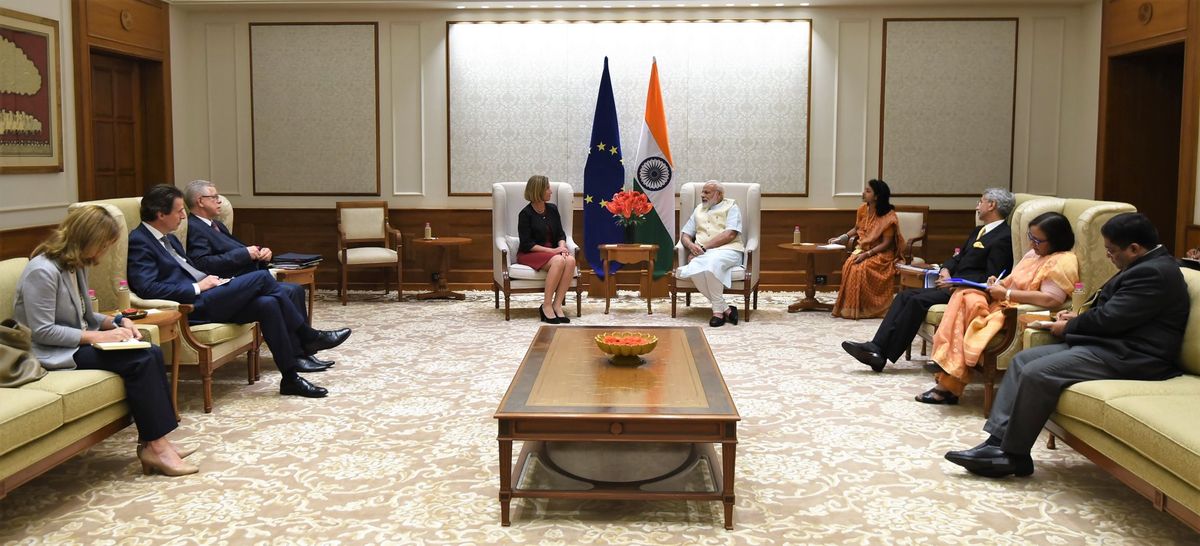
About
As a member of the Europe-India Research and Dialogue Network (EIRDN), Friends of Europe will host this by-invitation-only briefing to discuss the new EU-India Strategy, as well as the upcoming European and Indian elections.
The EIRDN is a focal point for research on Europe-India relations and track 2 and 1.5 initiatives of public diplomacy. The Network focuses on research, building upon and complementing the work of members and allowing for long-term research projects within its scope. Members share research, ask for feedback from peers and contribute to collaborative projects.
For more information about the event, please contact Amanda Rohde (amanda.rohde@friendsofeurope.org).
Related content:
- “Brexit, Asia and the increased lure of Europe” by Shada Islam
- “Towards the globalisation of tradition” by Haroon Sheikh
- “Culture change and law enforcement needed to make India safer for women” by Shruti Kapoor
PHOTO CREDIT: European External Action Service/Flickr
Schedule
Relations between India and the European Union are entering a more vibrant and dynamic era marked by enhanced bilateral ties and cooperation on global challenges. Recent EU proposals for boosting the EU-India strategic partnership, warmly welcomed by Delhi, set out an ambitious and aspirational list of areas for cooperation on maritime and cybersecurity, research and innovation, clean energy, climate change, water management and urbanisation. There are plans to increase technology sharing and know-how to speed up India’s sustainable modernisation and ensure better connectivity as well as to strengthen EU-India coordination on reforming global trading rules, implementing Agenda 2030 and the Paris Agreement on climate change. The new momentum is welcome and long overdue. Moving forward will, however, require that both sides show creativity, consistency and conviction: politicians and policymakers in Brussels and Delhi will be preoccupied with domestic and electoral concerns in the first half of 2019; unfinished negotiations on a Bilateral Trade and Investment Agreement continue to cast a shadow over EU-India relations; and both Brussels and Delhi will be distracted by geopolitical volatility and uncertainties.
- The EU strategy spotlights security, connectivity, clean energy and many other areas for enhanced bilateral cooperation. Which sectors should get priority as the EU and India move forward?
- How can the EU and India ensure that changing domestic and foreign policy priorities do not hijack and disrupt their plans for stronger interaction, especially in tackling global challenges?
- Given continuing difficulties in negotiating a trade and investment agreement, should both sides agree to ditch the talks and focus instead on a more focused deal on investments and services?
Speakers
Gaitri Issar Kumar
Ambassador of India to Belgium, Luxembourg and the European Union
Gunnar Wiegand
Managing Director for Asia and Pacific at the European External Action Service (EEAS)
Moderated by
Shada Islam
Managing Director at New Horizons Project
Activities
Europe-China Forum 2025
Next event In person & livestreamed

- Area of Expertise
- Global Europe
Trading tariffs and trade as a geopolitical tool
Past event

- Area of Expertise
- Global Europe
From aid to investment: shaping Europe's global role in a changing world
Past event Online

- Area of Expertise
- Global Europe
Future Africa-Europe High-Level Forum
Past event IN PERSON & ONLINE

- Area of Expertise
- Global Europe
Trump's betrayal of the world's poor is Europe's opportunity
- Category
- Frankly Speaking
- Author
- By Giles Merritt
Policy Voices | #Throwback: UNRWA’s Jonathan Fowler on Gaza: “It is a…
- Category
- Podcast
- Area of Expertise
- Global Europe
DRIVE Impact Initiative final report
- Category
- Event Reports
- Area of Expertise
- Global Europe
Europe’s blackouts call for a NATO-level response
- Category
- #CriticalThinking
- Author
- By Maurizio Geri

- Area of Expertise
- Global Europe

- Area of Expertise
- Global Europe

- Area of Expertise
- Global Europe

- Area of Expertise
- Democracy
Continue
the debate on
- Debating Europe
